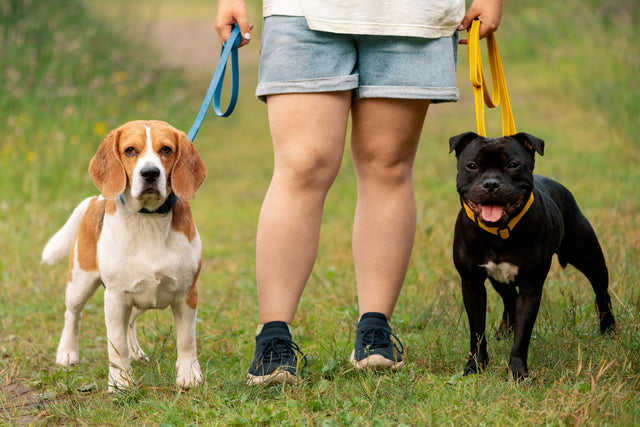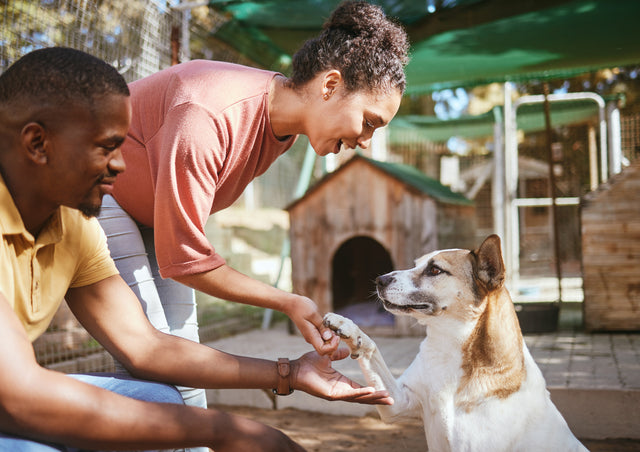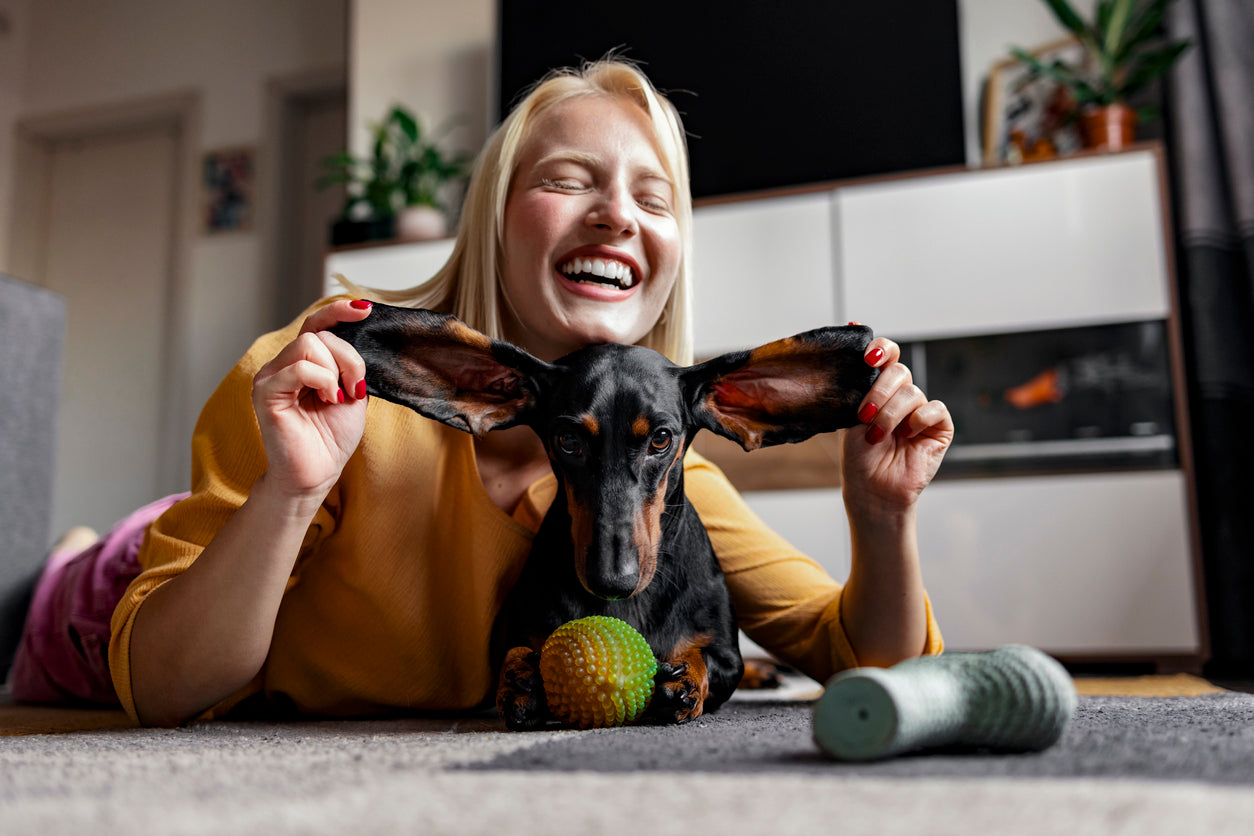If you have a canine friend, you know that a schedule provides your dog stability and comfort. When they know when to expect meals, walks, or playtime, they will make connections in their brain that make it easier for you also to maintain a regular schedule. Additionally, a predictable schedule can strengthen the bond you and your furry friend share, as they will feel safe, calm, and loved.
So, if you don't have a structure for your furry friend yet, it's time to pull your sleeves up because we're about to prepare you for how to get your dog into a routine.
Do Dogs Need Daily Routines?
A daily routine for dogs reassures furry babies of safety, providing them with support and calmness. It eases their worries and helps the adjustment phase, as having a structured timetable lets the canine know what to expect next.
A daily schedule for dogs fosters trust and connection between you and your four-legged companion, offering them stability in the unpredictable world. It lets them know they're loved, appreciated, cared for, and valued. This knowledge reassures them that each day is worth looking at as it's filled with activities that entertain and instill the concept of cooperation into them.
Benefits of Getting Your Dog Into a Routine
Getting your dog into a routine can offer numerous benefits for both you and your furry companion. Dogs are creatures of habit and thrive on consistency and predictability. Here are some of the key benefits of establishing a routine for your dog:
- Predictability: Dogs feel more secure and comfortable when they know what to expect. A routine provides them with a sense of predictability in their daily lives, reducing stress and anxiety.
- Behavioral Consistency: A routine helps reinforce desired behaviors and discourage unwanted ones. When dogs know when to eat, go for walks, and have playtime, they are more likely to behave appropriately.
- Training Facilitation: Consistent routines aid in training efforts. Dogs learn faster and more effectively when commands and behaviors are repeated in a consistent manner.
- Potty Training: Having a routine for bathroom breaks makes potty training easier. Regular outings help prevent accidents indoors and teach dogs to hold their bladder until they're outside.
- Physical and Mental Stimulation: Routine exercise, play, and mental stimulation are essential for a dog's well-being. A consistent routine ensures that your dog gets the necessary physical and mental activity to stay healthy and engaged.
- Better Sleep Patterns: Dogs thrive on a regular sleep schedule, just like humans do. A consistent routine can help regulate their sleep patterns, leading to better rest and overall health.
- Reduced Anxiety: Dogs are less likely to experience separation anxiety when they know when you'll be leaving and returning home. A routine establishes a sense of security and minimizes stress.
- Improved Digestion: Feeding your dog at the same times each day helps regulate their digestive system. This can prevent digestive issues and make it easier to monitor their appetite and eating habits.
-
Bonding and Trust: A routine strengthens the bond between you and your dog. They learn to trust you and rely on you for their daily needs and activities.
- Time Management: Having a routine for your dog can actually help you manage your own time better. Knowing when your dog needs walks, meals, and playtime allows you to plan your schedule accordingly.
- Health Monitoring: Regular routines make it easier to notice changes in your dog's behavior, appetite, or overall health. Any deviations from the routine might signal an underlying issue that needs attention.
- Socialization: Scheduled walks and outings can provide opportunities for your dog to interact with other dogs and people, helping improve their social skills.
Remember that while routines are beneficial, some flexibility is also important. Life can be unpredictable, and being overly rigid might cause stress if things don't go exactly according to plan. Strive for a balance between consistency and adaptability to ensure the well-being of both you and your furry friend.
How to Get Your Dog Into a Routine
We know your love for your loyal, tail-wagging companion is unexplainable. Yet, it can't excuse the necessity of having a structured routine in their lives. There is no ideal dog schedule, and your routine depends on several factors. It plays a huge role from your furry friend's age to breed, temperament, and lifestyle.
Nevertheless, it's crucial to have a daily routine for dogs, and here is a general idea of what the schedule for dogs should look like or include. Remember that each canine, even of the same breed, has different needs and wants, so tune in with your dog's needs and lifestyle habits to create a routine that works for your furry friend.
Morning Routines for Dogs
Mornings are exciting for dogs because it gives them a chance to interact with their favorite human again. Although there is no fixed morning routine for dogs, here's a general idea of a dog's daily schedule.
Once you've figured out your lifestyle and sleep schedule, try to settle on a time that gives you enough room to play with your dog. Your dog's routine can be altered to match your lifestyle, but the schedule needs to be followed. Otherwise, it gets difficult for dogs to make sense of it.
The morning routine with dogs should include a toilet, a stroll, a little playtime, and meals. As soon as your furry baby wakes up, take them out so they can use the bathroom.
The routine is then followed by a brisk walk to freshen them up. Once they're done walking, it's time for the first meal of the day: breakfast. Feeding your dog timely so they receive all the nutrients required for growth is essential. After breakfast, wait at least 30 minutes or an hour before taking them out to potty again.
Remember to change their water bowl and fill it with fresh water so they can drink it whenever they like throughout the day. The morning routines with dogs include interactive sessions such as playtime or training to ensure their physical and mental well-being. Remember to not indulge them in any physical regimen right after breakfast, or else it could lead to upset stomachs, such as diarrhea or bloating.
Creating a Feeding Schedule
Whether you have a pup, an adult dog, or a senior pup, having a fixed feeding schedule is crucial. By fixed schedule, we mean proper meals at least twice daily.
Try to offer your four-legged companion a meal at a fixed time every day to cultivate a sense of trust and structure in them. A haphazard feeding schedule could lead to anxiety and behavioral issues.
Ensure that the food you're offering your dog is a 'complete' food, meaning it's packed with all the nutrients required for your dog's health. Before preparing the food for your dog baby, don't forget to check the serving chart on the dog food packaging to ensure that you're not over or under-feeding your canine friend. Doing this would ensure that you're managing your dog's health and are taking all the necessary precautions to keep them in good spirits.
Occasional treats should also be a part of the daily routine for dogs as they keep the element of surprise alive in your furry friend's eyes. Make sure that every meal and treat is in moderation so that no harm comes your baby's way. Don't fall for their puppy eyes because these hounds have an insatiable appetite, but anything above or below moderation can lead to health issues.
Daily Exercise and Activity
Daily exercise and activity are an integral part of your dog's routine as it keeps them healthy physically and mentally. Therefore, having a set dog walking schedule is a must to offer your furry baby enough opportunities to interact with the world.
The daily routine for dogs should include at least one or two walks a day. The walks could be in a park or down the street, depending on the circumstances, but they shouldn't be missed as it offer many health benefits, such as increased cardiovascular fitness and strong muscles and bones.
A regular dog walking schedule also helps them interact with the broader social world and get in touch with nature, which boosts their confidence. It also allows them to interact with other dogs and people, thus providing opportunities for connection that elevate the mood. The stroll also serves as a special time for you and your baby to get along, thus weaving the hearts more.
Try playing activities such as fetch, hide and seek, or tug of war to entertain them. Indulging in these activities with your dog gives them a sense of purpose that makes them feel good.
Mental Stimulation and Training
Whether your dog is a pup or an adult, keeping them engaged is essential to be mentally and emotionally fit. To do this, it’s best to indulge them in activities or training that is mentally stimulating, such as playing puzzles or giving them challenging interactive toys that add fun. You can also reinforce the training activities with rewards and words of appreciation to keep the behavior consistent.
Grooming and Hygiene
The daily routine for dogs should include proper hygiene and grooming to ensure a clean dog. Keeping your furry baby clean is a must as it ensures their health.
The dog's routine should include brushing its coat regularly to avoid tangles. It would also ensure they are properly maintained and free of any bugs.
As far as hygiene is concerned, brushing the teeth must be a part of the daily routine for dogs as it prevents tooth decay. Regular or alternate baths are advisable to keep them fresh and clean. Trimming of nails is also recommended to prevent any discomfort or injury to your pup.
Nighttime Routines for Dogs
After the evening meal:
- Take your dog out for a stroll.
- Give them time to eliminate themselves before bedtime to avoid any middle-of-the-night accidents.
- Tuck them in bed or signal a "goodnight" cue to indicate bedtime has started.
Doing this daily would ensure that the habit is built, thus cultivating good sleep habits in your furry friend.
Sticking to the Routine
There is no one rule. The daily routine of your dog depends on their needs and your lifestyle habits. Consistency and commitment are critical factors that can make or break your dog's routine game.
Some days would be more challenging than others, but sticking to the routine that you chose fits right for your pup would benefit your furry friend immensely. The purpose of sticking to the routine is to provide a structure to your dog's life so that each day is filled with something that excites them.
And, if you need a place to keep your pet during the day as part of their routine, check out our clear pet pens, as they can help create consistent routines.More stories

How To Select A Reliable Pet Sitter


